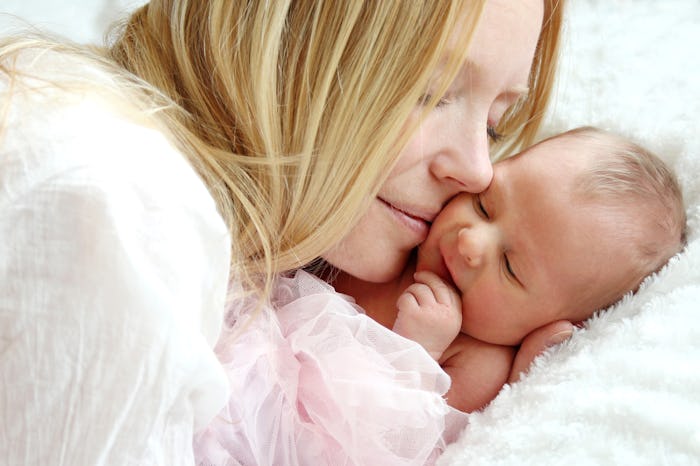Life

How Cuddling Affects Your Baby's Brain
I'm pretty sure cuddling is the first thing on any new mom's list of things she's looking forward to on any given day. For me, at least, responsibilities like feedings, diaper changes, terrifying newborn baths, and tiny fingernail trimmings much lower on the list. It's a good thing that it's the most appealing thing to parents, too, because the ways in which cuddling affects your baby's brain are incredibly beneficial. Hey, don't take my mom-who-loves-to-cuddle-her-daughter word for it. Just ask science.
Alyson Shaw, a pediatrician at the Children’s Hospital of Eastern Ontario, told Today's Parent that cuddling is actually critical for your baby's brain development. It wasn't the easiest theory to test, obviously, because who's going to allow their newborn to go un-cuddled for weeks on end, right? But according to TIME's science department, a study published a few years ago in Biological Psychiatry managed to do just that.
Scientists were able to compare a set of premature babies in a NICU hospital in order to see how cuddling and physical touch affected the babies' development over time. What the study called "kangaroo care," or holding a baby instead of leaving it in a swing or crib, was only newly being introduced to hospitals, so it was still the normal standard of care not to hold babies for fear they'd catch germs that would adversely affect their already frail health.
The researchers were then able to look at the development of both sets of babies over the course of months and years. At 3, 6, 12, 18 and 24 months, then at 5 and 10 years, babies were examined to determine how they were sleeping, socializing, and developing. As explained in TIME, the babies who were held one hour each day for two weeks after birth, fared much better: "As babies, they had more organized — or predictable — sleep patterns, steadier respiration and heart rates, and better affective attention — or the ability to direct their gaze and actions toward a goal."
The big news from the study was that babies didn't need to be cuddled every minute of every day in order to receive the benefits of being cuddled. They were only cuddled for an hour a day for 14 days, but their levels of oxytocin (the hormone that makes babies feel happy and connected to their parents) were markedly higher compared to the babies who weren't held at all during the same time period. Their stress hormones were lower and they were more able to regulate their own emotions and calm themselves.
A more recent study looked at the impact of skin-to-skin contact between parents and their newborn babies, and concluded that holding and cuddling your baby puts your baby in no danger of being spoiled or coddled. Instead, it provides the first building block of communication and regulation that a baby learns — even before sight and hearing.
So great news, parents: all that cuddling will only help your baby's brain develop and grow. So leave the dishes for another day and order out instead of cook, because cuddling your baby is doing them some developmental good.